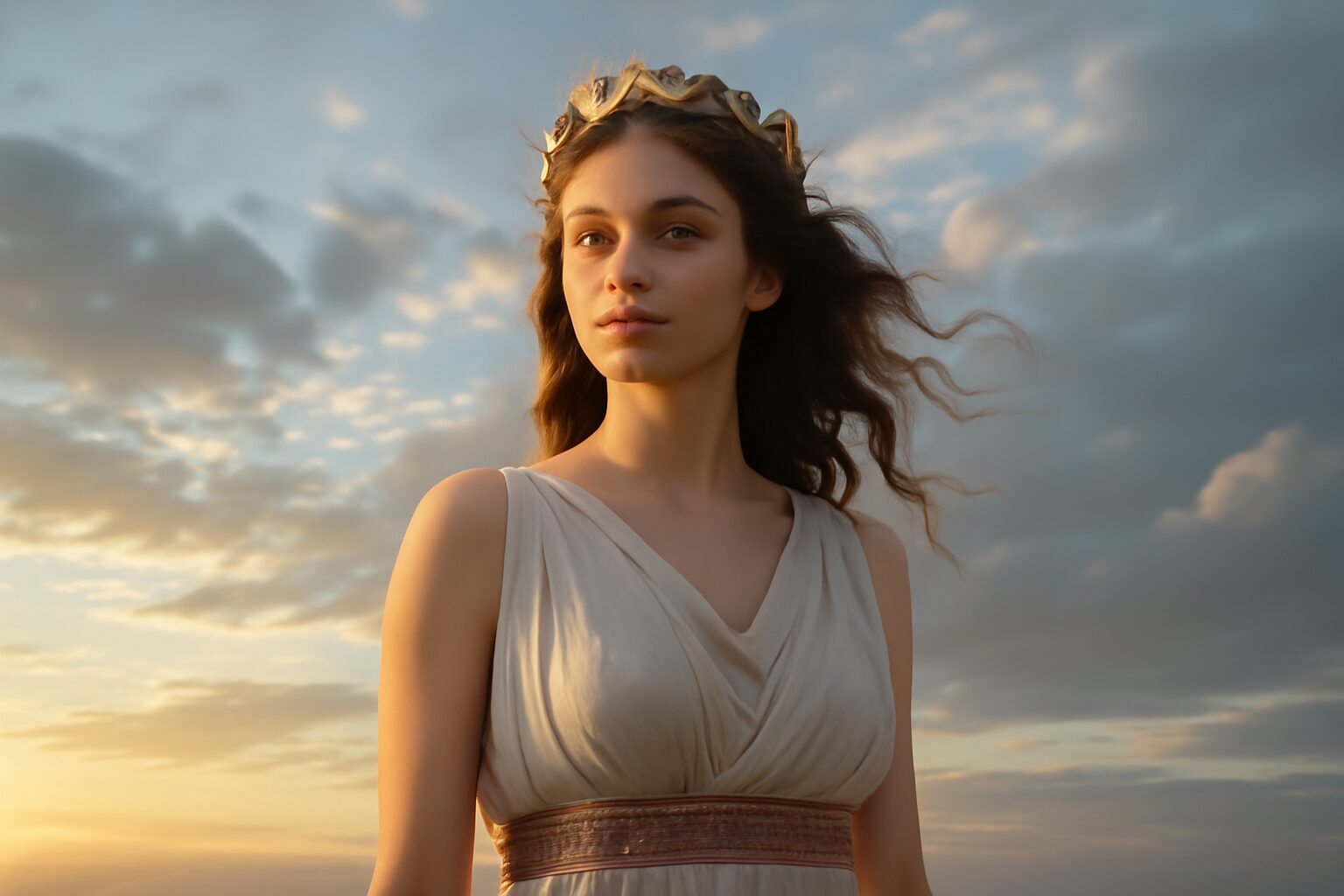Alectrona: The Dawn Goddess
Alectrona, though lesser-known in Greek mythology, was a fascinating deity associated with the morning and the sun's first light. Often considered a daughter of Helios, the sun god, or Rhode, a sea nymph, she embodied the gentle transition from night to day. Her name itself hints at her role—derived from the Greek word alektor, meaning "rooster," the herald of dawn.
Mythology and Worship
Unlike major Olympian gods, Alectrona's myths are sparse, but she was venerated in parts of Greece, particularly Rhodes, where she may have been linked to local solar cults. Some scholars suggest she was worshiped as a protector of sailors, guiding them safely with the morning light. In rare accounts, she is described as a winged goddess, symbolizing the swift arrival of dawn.
Powers and Symbolism
Alectrona's domain was the liminal space between darkness and light. She was believed to wield influence over the early morning hours, ensuring the sun's rise and the dispelling of night's shadows. Her connection to Helios positioned her as a minor solar deity, though her gentler, more ephemeral nature distinguished her from her father's blazing might. Roosters, often sacrificed in her honor, were sacred to her, representing vigilance and renewal.
Relationships and Legacy
As a daughter of Helios, Alectrona belonged to a powerful divine lineage, including the infamous sorceress Circe and the ill-fated Phaethon. Her ties to the sea through Rhode also connected her to maritime myths. Though overshadowed by deities like Eos (goddess of dawn), Alectrona's presence highlights the Greeks' reverence for the subtle, daily miracles of nature—light breaking over the horizon, signaling hope and new beginnings.
While her worship faded over time, Alectrona remains a poetic figure in Greek mythology, a quiet but essential force in the cosmic order—reminding us that even the smallest lights can hold profound power.
Alternative Names for Alectrona
God Name: Electryone (Greek)
An alternative name for Alectrona, derived from the Greek word 'elector' meaning 'beaming' or 'shining,' highlighting her association with the morning or waking light.
God Name: Matuta (Roman)
In Roman mythology, Alectrona was sometimes associated with Mater Matuta, the goddess of dawn and childbirth, reflecting similar attributes of light and renewal.
God Name: Alektrona (Greek)
A variant spelling of Alectrona, maintaining the same meaning and associations with the morning or waking light in Greek mythology.
Tales about Alectrona
Alectrona and the Dawn's First Light
In the quiet moments before the sun's ascent, Alectrona would often join her sister Eos, the rosy-fingered goddess of dawn. Together, they painted the horizon with hues of gold and amber, heralding the arrival of Helios. One morning, as they worked their magic, a mischievous wind spirit attempted to scatter the colors, threatening to leave the world in gloom. With swift grace, Alectrona summoned a radiant beam of morning light, piercing through the chaos and restoring order. Eos, grateful for her sister's vigilance, gifted her a shimmering veil woven from the first rays of day, which Alectrona wore as a symbol of her role in awakening the world.
The Gift of Illumination
From that day forward, mortals would offer prayers to Alectrona at daybreak, seeking her blessing for clarity and new beginnings. Her light became a beacon of hope, ensuring that no darkness could overshadow the promise of a new day. Sometimes, Maia would join them, her gentle presence enhancing the morning's tranquility, while Eusebeia watched over the sacred rituals performed in Alectrona's honor. Even Taygete, one of the Pleiades, would occasionally grace the dawn with her celestial light, adding to the splendor of the morning sky.
Alectrona's Encounter with the Sea Nymph
While wandering the shores of Rhodes, Alectrona encountered Leucothea, the sea nymph known for aiding sailors in distress. Leucothea was distressed, for a sudden storm had trapped a fleet of ships, and her powers alone could not calm the furious waves. Alectrona, moved by the nymph's plight, ascended to the sky and cast a brilliant, guiding light through the tempest. This illumination pierced the storm clouds, allowing the sailors to navigate to safety. In gratitude, Leucothea pledged to always honor Alectrona's light, and the two goddesses formed an alliance between sea and sky.
A Bond Forged in Light
To this day, sailors speak of the "Alectrona's Beam"—a sudden, guiding light that appears during storms, a testament to the enduring bond between the goddess of morning light and the protector of sailors. This alliance was sometimes witnessed by Thoosa, who marveled at how Alectrona's radiance could calm even the wildest seas, while Soteria saw it as a symbol of salvation for those in peril. On occasion, Lips, the god of the southwest wind, would carry tales of this miraculous light to distant shores, spreading hope among seafarers everywhere.
Frequently Asked Questions
Who is Alectrona in Greek mythology?
Alectrona is a minor Greek goddess associated with the morning or sunrise, often considered a daughter of the sun god Helios. She symbolizes the start of a new day and the light that dispels darkness.
Why is Alectrona important in Greek mythology?
Alectrona represents the concept of dawn and renewal, which was important to ancient Greeks as it signified hope, new beginnings, and the cyclical nature of time. Her role highlights the Greeks' reverence for natural phenomena.
What can we learn from the myth of Alectrona?
Alectrona's connection to the sunrise teaches us about the ancient Greeks' appreciation for daily renewal and the power of light over darkness. Her myth encourages embracing new opportunities and the promise of each day.
How does Alectrona's symbolism apply today?
Alectrona's themes of dawn and renewal remain relevant as metaphors for personal growth, resilience, and optimism. Her symbolism can inspire people to view each day as a fresh start.
Are there any rituals or festivals for Alectrona?
While no major festivals are widely documented for Alectrona, some local traditions in ancient Greece may have honored her at sunrise with simple offerings or prayers, reflecting her connection to daily light.













